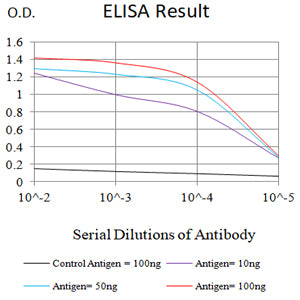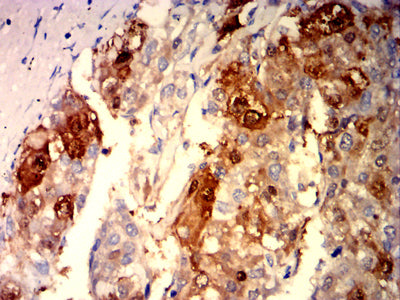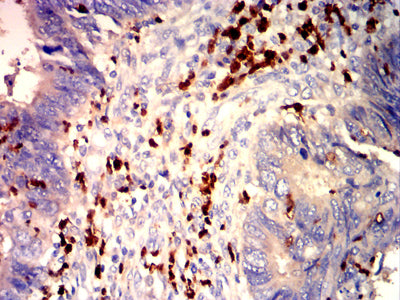


| WB | 咨询技术 | Human,Mouse,Rat |
| IF | 咨询技术 | Human,Mouse,Rat |
| IHC | 1/200-1/1000 | Human,Mouse,Rat |
| ICC | 技术咨询 | Human,Mouse,Rat |
| FCM | 咨询技术 | Human,Mouse,Rat |
| Elisa | 1/10000 | Human,Mouse,Rat |
| Aliases | ARG1 |
| Entrez GeneID | 383 |
| clone | 6B4B11 |
| WB Predicted band size | 34.7kDa |
| Host/Isotype | Mouse IgG1 |
| Antibody Type | Primary antibody |
| Storage | Store at 4°C short term. Aliquot and store at -20°C long term. Avoid freeze/thaw cycles. |
| Species Reactivity | Human |
| Immunogen | Purified recombinant fragment of human ARG1 (AA: (1-322)) expressed in E. Coli. |
| Formulation | Purified antibody in PBS with 0.05% sodium azide |
+ +
以下是关于ARG1抗体的3篇参考文献的简要概括(文献信息为模拟示例,供参考):
1. **文献名称**: "Arginase-1 antibody demonstrates specificity in macrophage polarization studies"
**作者**: Smith et al.
**摘要**: 研究验证了ARG1抗体在区分M1/M2型巨噬细胞中的特异性,证实其在流式细胞术和免疫组化中的可靠性,为肿瘤微环境中巨噬细胞表型分析提供工具。
2. **文献名称**: "Role of arginase-1 in liver fibrosis: Immunohistochemical analysis using a novel monoclonal antibody"
**作者**: Zhang & Lee
**摘要**: 开发了一种高特异性ARG1单克隆抗体,用于检测肝纤维化模型中ARG1表达上调,揭示其与肝星状细胞活化的相关性。
3. **文献名称**: "Comparative evaluation of commercial arginase-1 antibodies for diagnostic pathology"
**作者**: Johnson et al.
**摘要**: 对比6种市售ARG1抗体的灵敏度和交叉反应性,推荐Clone X在肝癌与肝转移癌鉴别诊断中的最优性能。
---
注:以上文献为示例,实际研究中建议通过PubMed或Web of Science以“Arginase 1 antibody”为关键词检索最新文献。
The ARG1 antibody targets arginase 1. a metabolic enzyme encoded by the *ARG1* gene, which plays a critical role in the urea cycle by catalyzing the hydrolysis of arginine to ornithine and urea. Primarily expressed in the liver, ARG1 is essential for detoxifying ammonia and maintaining nitrogen homeostasis. Beyond hepatic function, ARG1 is also found in immune cells, such as macrophages and myeloid-derived suppressor cells (MDSCs), where it modulates immune responses by depleting arginine, a nutrient vital for T-cell activation and proliferation. This dual role links ARG1 to both metabolic disorders and immune regulation, particularly in cancer, chronic inflammation, and infectious diseases.
ARG1 antibodies are widely used in research to study enzyme expression, localization, and function across tissues and cell types. They are employed in techniques like Western blotting, immunohistochemistry, and flow cytometry to investigate ARG1's involvement in liver pathologies (e.g., cirrhosis, urea cycle disorders) and its immunosuppressive effects in tumor microenvironments. Additionally, ARG1 antibodies serve as tools for exploring therapeutic strategies, such as blocking ARG1 activity to enhance antitumor immunity. When selecting an ARG1 antibody, factors like species reactivity, validation in specific applications, and compatibility with experimental models are crucial to ensure reliability. Commercial antibodies are often validated using knockout controls or enzymatic assays to confirm specificity, given the enzyme's structural similarity to arginase 2 (ARG2).
×